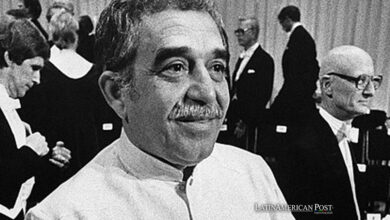Colombia recognizes Palestine as a free and sovereign state
Although this decision was taken during Juan Manuel Santos's government, the issue of Palestine is not new for Colombia

On August 8, Colombia became the last country in South America to recognize Palestine as a free and sovereign state. The decision was informed through a letter of August 3 signed by María Ángela Holguín, Minister of Foreign Affairs of the Santos government. However, the implications of this decision will fall on Carlos Holmes Trujillo, who with the rise of President Ivan Duque will replace Holguin.
Leer en español: Colombia reconoce a Palestina como un Estado libre y soberano
For its part, the Palestinian embassy in Colombia issued a statement stating that "This decision is deeply grateful for the Palestinian people and their government, who have always seen Colombia and its people as tireless brothers in the search for peace. This fraternity has been built for more than a century and today is materialized with one of the most numerous Palestinian communities in Latin America", that the decision "will contribute significantly to generate the necessary conditions in the search for peace in the Middle East" because "Colombia has not been oblivious to the conflict in Israel and Palestine", and that the country has "demonstrated [an] unchanging interest for 70 years".
Read also: Yarmuk: the symbol of Palestinian resistance, today is a ghost town
Context
Although this decision was taken during the government of Juan Manuel Santos, the issue of Palestine is not new for Colombia. In 1947 Alfonso López Pumarejo, former president and then ambassador to the UN, established the López Doctrine to "maintain a sensible balance before the hasty decisions that were being taken at the United Nations, in particular in the Security Council, related to the issue of the partition of Historical Palestine and the creation on its soil of the State of Israel ".
In 1976, the country signed UN Resolution 3120 demanding the withdrawal of Israeli troops in Palestine and the return of refugees.
On the other hand, in 1940 Colombia proposed the internationalization of Jerusalem so that this city could count on permanent neutrality.
However, according to local newspaper El Tiempo, "Colombia's tendency in the Security Council during the different periods in which it was a non-permanent member, consisted in recognizing the imperative need to consolidate a negotiated solution to the conflict, establishing a position in line with international law in relationship with the central axes of the conflict agenda but these positions did not affect its policy towards Israel nor did they substantially serve to define the position on the recognition of the Palestinian State in 2012".
In fact, it was thought that Colombia would not give recognition to Palestine because of the closeness that the Colombian government has always had with the US and the absence of debate about it in the country. This added to the statements that in 2011 gave Juan Manuel Santos affirming that before a delegation of the World Jewish Congress that "Colombia will not recognize a unilateral Palestinian State".
International implications
The big question after this decision is what will it imply for relations between Colombia, the United States, and Israel. As it is well known, since the 1960s, Colombia and the United States (Israel's greatest ally) have generated close relations in political, economic and military terms.
In addition, Colombia has also received support from the government of Israel who supported the Colombian command in Operation Jaque and has sold Galil rifles to the country. In addition, according to El Tiempo, "the Israeli Army commander in the Gaza Strip withdrew and went to the private sector to advise the then Minister Juan Manuel Santos. Colombia spent about 40 percent of the ministry's purchase budget for weapons in Israel" and, in 2013, trade with Israel accounted for 80% of trade between Colombia and the Middle East.
As a result of this, it is coherent to think that Colombia's decision will generate economic impacts, although these may not be as strong as they could have been if the decision had been made at another time, because thanks to the peace agreement signed between the government Santos and the FARC, the country no longer requires foreign military support.
So far, US President Donald Trump has not spoken out against Colombia's decision. For its part, the government of Israel stated in a press release that "for Israel, the decision, taken by the government of Juan Manuel Santos in his last days and known this Wednesday, August 8, during the first day of Ivan Duque's government, is a slap in the face of a faithful ally, which contradicts the quality of relations and the closeness between countries and their leaders". However, nothing else has been said about it.
LatinAmerican Post | Sofía Carreño
Translated from "Colombia reconoce a Palestina como un Estado libre y soberano"





